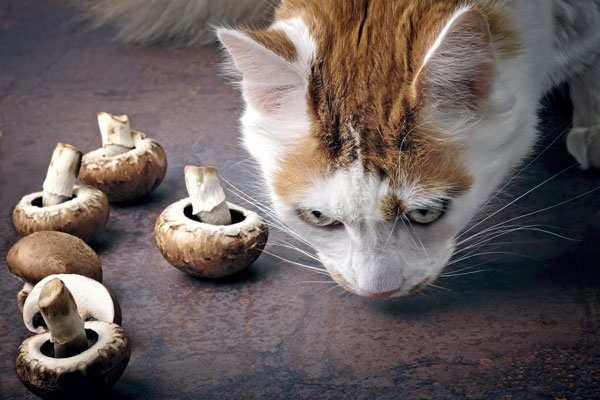Mushrooms are a staple ingredient in a variety of foods, including pizzas, kabobs, pastas, sautés, and omelets. Some people even prefer eating mushrooms as standalone snacks.
Although mushrooms have been around from time immemorial, they’ve garnered tremendous popularity in recent years. That’s due to the growing body of studies citing these fungi for their incredible nutritional profile as well as their ability to treat or prevent certain diseases.
Mushrooms have particularly become popular with vegetarians. Today, it’s almost impossible to miss Portobello burgers or mushroom-based mock meats in restaurant menus or grocery stores.
If you’re a fan of mushrooms and also happens to own a cat, you may often find it difficult to resist the temptation of sharing these delicious meaty fungi with your feline friend. But before you do, it’s important to establish whether mushrooms are safe or even nutritionally beneficial to cats. And that begs the question, can cats have mushrooms?
The short answer is ‘maybe.’ Most store-bought mushrooms are safe for cats. However, the same cannot be said about wild mushrooms. Almost all varieties of wild mushrooms are downright toxic for cats and should never find their way into your cat’s food.
In this post, we shall share everything there is to know about cats and mushrooms, with a special focus on the potential benefits and risks of mushrooms for cats.
Table of Contents
Are Mushrooms Bad for Cats?
As we’ve just pointed out, the safety or toxicity of mushrooms for cats mainly depends on the variety of mushrooms your feline friend has eaten. Generally, store-bought mushrooms are safer for cats than wild mushrooms.
But as you shall find, the fact that certain foods are safe for cats doesn’t necessarily make them nutritious. Cats have a dietary evolution that doesn’t allow them to enjoy the nutritional and health benefits in mushrooms the same way humans do.
If you must feed mushrooms to your kitto, always ensure you consult your vet first.

Do Cats Love Mushrooms?
Cats are generally uninterested in fruits and vegetables. In most instances where cats demonstrate an interest in fruits and veggies, they’re usually driven by the desire to play and not eat these plant-based foods. That’s only understandable, considering that cats are obligate carnivores.
An obligate carnivore refers to an animal that can live exclusively on a diet made up of animal-based products, such as lean meat, blood, skin, and bones. That’s in contrast to facultative carnivores, which can comfortably supplement with plant-based products.
But if you regularly cook with mushrooms, you must have noticed a heightened level of curiosity in your cat whenever you’re chopping mushrooms in the kitchen. And that may get you wondering, do cats love mushrooms? Yes, cats do love mushrooms and there’s a valid scientific reason why.
To understand why cats love mushrooms, it’s important to familiarize yourself with how a cat’s taste buds work.
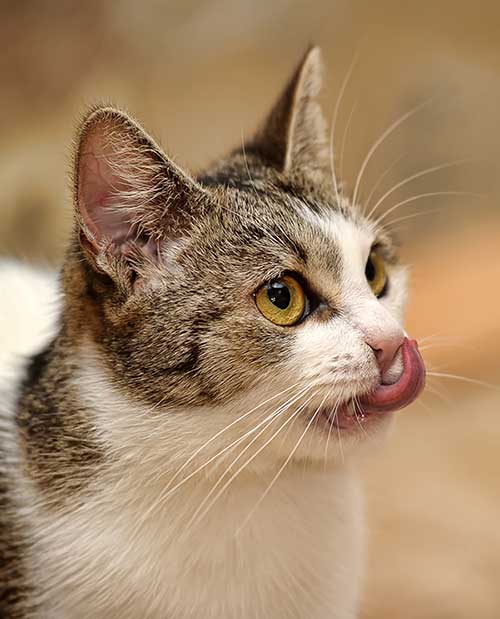
According to food scientists, cats are unable to taste sweetness. That’s because they lack a functional gene which controls sweetness taste receptors. However, they can easily taste savory or umami flavors.
Umami flavor is one of the five basic flavors human taste buds can pick up. The others include Sweet, Salty, Sour, and Bitter.
Now, mushrooms contain significant levels of the amino acid glutamate. Glutamate is a crucial component of umami foods. The fact that cats love umami tastes explains why they would be happy to gorge themselves on mushrooms.
Another reason cats seem attracted to mushrooms is due to the meaty texture of these fungi. Not only do mushrooms feel meaty to the touch, they also feel meaty when chewing. So, an unsuspecting cat may believe that they’re actually eating meat.
- One (1) 14 lb. Bag - Purina Pro Plan High Protein Cat Food With Probiotics for Cats, Shredded Blend Chicken and Rice Formula
- High protein formula, with real chicken as the first ingredient. Fortified with guaranteed live probiotics to support digestive...
- Crunchy kibble and meaty, shredded pieces for a delicious mealtime experience. Used to be known as SAVOR Shredded Blend Chicken...
Last update on 2024-07-22 / Affiliate links / Images from Amazon Product Advertising API
Are mushrooms safe for cats then?
The fact that cats are attracted to mushrooms isn’t a valid reason to offer them these fungi. In fact, cats’ profound love for mushrooms is more of a curse than a blessing.
It means that your kitto can easily help himself to mushrooms behind your back. If such mushrooms happen to be toxic, the consequences can be disastrous.
Also, remember that mushrooms are technically plant-based foods. And as we’ve already pointed out, cats are better off with a diet rich in animal protein.
Potential Benefits of Mushrooms for Cats
Mushrooms are loaded with several nutrients that cats can benefit from.
The following are possible ways your cat can benefit from mushrooms.
1. Aiding Heart and Cardiovascular Health
Mushrooms contain a form of soluble dietary fiber known as beta-glucan. This fiber is noted for its ability to improve blood cholesterol and regulate blood sugar.
Therefore, supplementing your cat’s diet with mushrooms may help to keep type 2 diabetes and heart disease at bay.
Besides beta-glucan, mushrooms also boast B vitamins like niacin, riboflavin, and pantothenic acid. These vitamins work synergistically to protect your cat’s health.
B vitamins play roles in other physiological processes too. For instance, niacin aids the digestive system and maintains healthy skin, while riboflavin maintains red blood cells. Pantothenic acid facilitates the secretion of vital hormones and also maintains the nervous system.
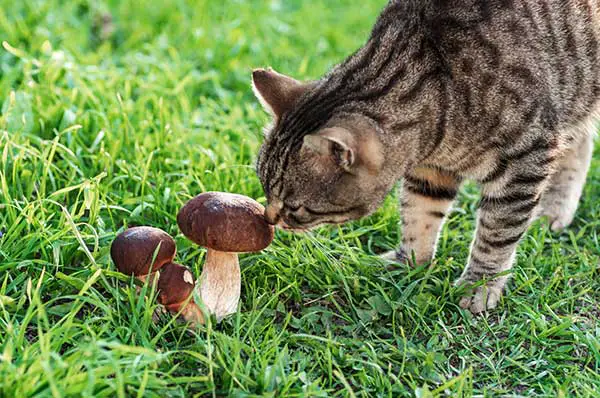
2. Prevention of Disease
Type 2 diabetes and heart disease are not the only medical conditions that mushrooms may protect your cat from.
These fungi also contain powerful antioxidants called selenium, which could lower the risks of other chronic diseases like cancer.
3. Flavor Enhancing
You can use mushrooms to enhance the taste of your cat’s food, thanks to the abundant umami flavors in these fungi.
If your kitto has lost his appetite and won’t eat his regular food, mixing some mushrooms into his food might help him regain his appetite.
The following are other essential minerals in mushrooms, along with their potential benefits for cats;
✔ Copper
Aids in the manufacture of red blood cells, while also supporting bone health and the nervous system.
✔ Potassium
Maintains fluid balance and supports heart health. Potassium also supports muscles and the nervous system.
- Works as a dog food topper - For pet parents looking for an alternative to capsules, raw treats, or soft chews, all it takes is a...
- A tasty & body nourishing treat for cats & dogs - Essential fatty acids for a healthy coat.
- Powerful Omega Fatty Acids - This premium fish oil liquid formula is loaded with the healthy Omega-3 fatty acid (with epa and dha)...
Last update on 2024-07-23 / Affiliate links / Images from Amazon Product Advertising API
Which Mushroom Varieties Are Safe For Cats?
We’ve previously stated that store-bought mushrooms are generally safer for cats (and even humans) than their wild counterparts.
However, the best way to establish the safety of mushrooms for cats is to research the specific mushroom varieties.
Can cats eat Portobello mushrooms?
Portobellos are the most meaty and flavorful mushrooms. They’re also perfectly safe for humans and cats alike.
Can cats eat baby Bella mushrooms?
Also known as cremini mushrooms, baby Bella mushrooms are edible and safe for cats.
Baby Bellas are also considered younger versions of Portobello mushrooms, which makes them even safer for cats.
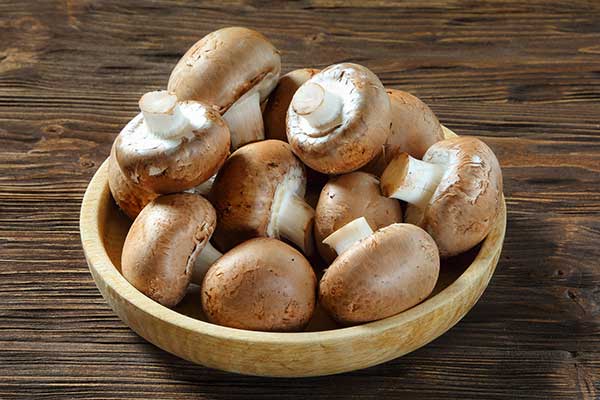
Can cats eat enoki mushrooms?
Enoki, also known as velvet shank, is a species of edible mushrooms popular in Japanese cuisine. This mushroom variety is safe for cats.
Can cats have chaga mushroom?
Chaga is another popular edible mushroom variety that you can feed your cat. However, keep the portions low, especially if your cat is diabetic.
The mushroom has been linked to adverse effects on insulin as well as an ability to prevent blood clotting.
Are button mushrooms bad for cats?
The term ‘button mushroom’ simply refers to mushroom whose pileus hasn’t expanded. They’re often contrasted form oyster mushrooms, which feature fan-shaped caps.
Button and oyster mushrooms can be white, tan, or gray, with gills lining their undersides.
So, can cats eat oyster mushrooms? What about button mushrooms, can cats eat button mushrooms?
All oyster mushrooms and most button mushrooms are edible and safe for cats.
Can cats have turkey tail mushrooms?
Turkey tail mushrooms typically grow on dead logs in woodland environments.
They contain brown and tan rings that resemble a turkey’s tail feathers, from where they get their name. These mushrooms are edible.
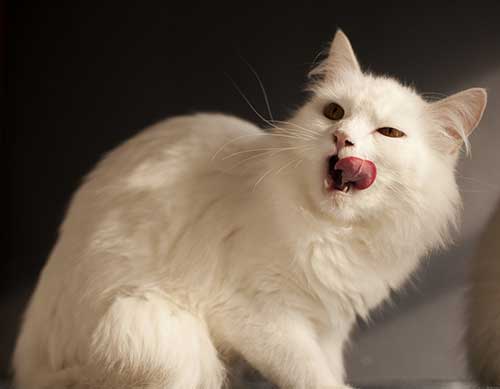
Can cats eat lion’s mane mushrooms?
Also known as yamabushitake or hou tou gu, lion’s mane mushrooms refer to large, shaggy mushrooms that look like a lion’s mane.
Not only are lion’s mane mushrooms edible. Studies have also shown these mushrooms might treat leukemia in humans. That makes them potentially beneficial to cats too.
Can cats eat morel mushrooms?
Morel mushrooms are another edible mushroom variety that cats can safely eat.
But as with other edible mushrooms, only feed morel mushrooms to your kitto in moderation.
Are edible mushrooms bad for cats?
Besides the above-mentioned mushroom varieties, most other edible mushrooms are considered safe for cats. Examples include shiitake, maitake, and beech mushrooms.
- 3-TIER CAT TOWER - The tiered design of this 35-inch-tall cat tree tower offers 3 levels of interactive fun and is the perfect...
- A CAT NAPPER’S DREAM - Your feline friends will love to curl up in the 19.25-inch-long kitty house that features 2 doors, a...
- SISAL SCRATCHING POSTS - The 3 sisal rope scratching posts help deter your pet from using your furniture to sharpen and trim their...
Last update on 2024-07-22 / Affiliate links / Images from Amazon Product Advertising API
What Happens If A Cat Eats Mushrooms?
We’ve just highlighted the various ways cats could benefit from eating mushrooms. But before you share these fungi with your feline friend, it’s important to understand everything that could possibly go wrong.
First off, note that while mushrooms are fungi, they’re generally considered plants. Feeding plant-based foods to cats isn’t a wise idea. That’s because cats are obligate carnivores and their digestive system considers plants as foreign substances.
So, as with most plant-based products, mushrooms can trigger a host of gastrointestinal complications in cats. Common symptoms of gastrointestinal distress include vomiting, diarrhea, and abdominal pain.
However, digestive complications aren’t the only thing that could go wrong if your cat ate mushrooms. Mushrooms, particularly the wild varieties, contain amanitins, muscarines and isoxazoles. These compounds may cause mushroom poisoning in cats.
Some of the side effects of mushroom poisoning include;
✔ Symptoms of gastrointestinal distress, such as nausea, vomiting, loss of appetite, diarrhea, flatulence, and abdominal pain or discomfort,
✔ Dehydration, which often results from vomiting and/or diarrhea,
✔ Drooling,
✔ Fatigue,
✔ Extreme sensitivity to sound and light,
✔ Poor balance and coordination,
✔ Jaundice (yellowing of the eyes or skin), resulting from liver toxicity,
✔ Irregular heartbeats.
Can wild mushrooms hurt cats?
If you’re a mushroom lover who’s also a proud cat owner, you may have often wondered, what mushrooms are poisonous to cats?
As we’ve just pointed out, wild mushrooms are the most toxic mushroom varieties for cats.
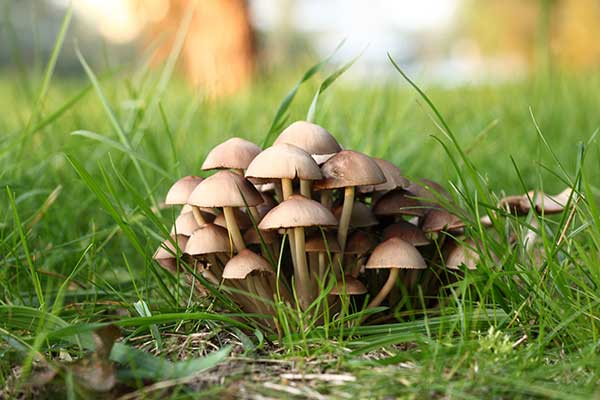
Now, it’s important to note that wild mushrooms aren’t just mushrooms that grow in the forests or abandoned parks. They also include any mushrooms growing in your backyard, lawn, garden, or walking trail. That begs the question, are lawn mushrooms poisonous to cats?
The mere fact that lawn mushrooms are considered wild mushrooms makes them potentially harmful to cats.
Are store-bought mushrooms bad for cats too?
No. Store-bought mushrooms are considerably safer for cats than their wild counterparts if fed in moderation.
What of psychedelic mushrooms, can cats eat psychedelic mushrooms?
Psychedelic mushrooms are also called magic mushrooms, psilocin mushrooms, or simply shrooms. And no, cats shouldn’t eat psychedelic mushrooms, regardless of whether these mushrooms grow wildly or not.
Like any recreational drug, psychedelic mushrooms can trigger euphoria and a host of other side effects, including;
- Visual hallucinations,
- Disorientation,
- Unexplained aggression,
- Anxiety and irritability,
- High blood pressure,
- Elevated heart rate,
- Fever,
- Convulsions.
- EASY TO USE, IMPACTFUL RESULTS: Collect a sample, package it up, and send it securely back. Just register, swab, return with the...
- MOST COMPREHENSIVE BREED & TRAIT: Our test distinguishes over 20+ distinct breeds and 50+ trait markers with the most...
- SCREEN FOR 40+ GENETIC DISEASES: Get peace of mind by screening for 64 health markers associated with 43 diseases for which your...
Last update on 2024-07-23 / Affiliate links / Images from Amazon Product Advertising API
So, are mushrooms toxic to cats?
Yes, numerous mushroom varieties, especially wild ones, are highly toxic to cats.
Can mushrooms kill cats?
Based on the potential risks of mushrooms for cats that we’ve just highlighted, you might be wondering, can cats die from eating mushrooms?
Your cat may not drop dead right after eating mushrooms. However, some of the side effects of wild mushroom poisoning, such as liver failure, could eventually kill your cat.
Can mushrooms make cats sick?
Not only can certain mushroom species make your cat sick. But they can also induce a coma and even kill your adorable kitto.
Can Cats Eat Raw Mushrooms?
So far, we’ve established that many edible mushroom species are safe and contain potentially beneficial nutrients for cats. We’ve also seen that most wild mushroom varieties are toxic to cats. So, if you must feed mushrooms to your cat, the first thing to do is to opt for edible varieties.
But there’s also the question of raw versus cooked mushrooms, and which between these options is safer for cats.
Cats can eat mushrooms, raw or cooked, provided the fungi are free from the compounds known to cause mushroom toxicity in cats.
However, you’re better off feeding your cat cooked as opposed to raw mushrooms, and for obvious reasons.
It’s true that raw mushrooms retain most of their nutritional elements, including those that would have been destroyed by cooking. But raw mushrooms also tend to contain lingering bacteria and parasites that might find their way into your cat’s digestive system.

Are cooked mushrooms OK for cats then?
Since raw mushrooms are discouraged for cats, you may now be wondering, can cats eat cooked mushrooms? Yes, the best way to feed mushroom to your cat is to cook them first.
There are various methods to prepare mushrooms for human consumption. You could boil, steam, grill, roast, or sauté them. When it comes to mushrooms for cats, consider a cooking method that doesn’t require the addition of salt, fats, or spices like onions and garlic.
That begs the question, can cats eat mushrooms and onions?
No, onions rank among the top spices that cats shouldn’t eat. So, cats shouldn’t eat any onion-containing foods, including mushrooms.
Can cats eat mushroom soup?
The fact that cats can eat cooked mushrooms also means they can comfortably eat mushroom soup. However, keep the portions low as too much mushroom soup might induce diarrhea.
Still on cooked mushrooms for cats, you might be wondering, can cats eat mushrooms from pizza?
Regular pizza contains numerous ingredients that cats shouldn’t eat, such as flour, dairy products, and spices. So, mushrooms from pizza aren’t safe for cats.
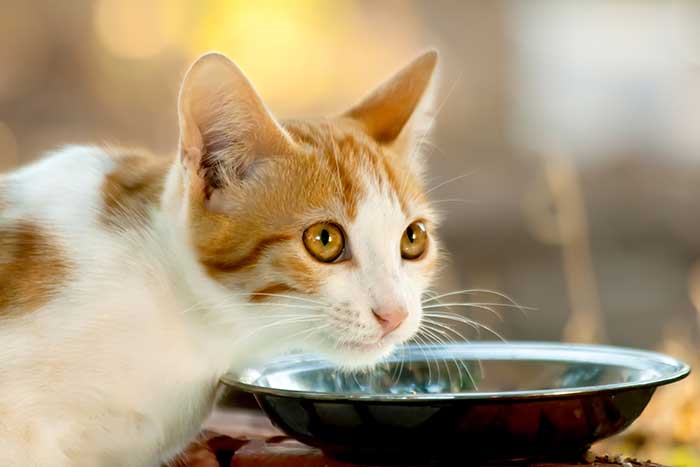
What of dried mushrooms, can cats eat dried mushrooms?
Dried mushrooms usually have considerably high concentrations of compounds. Which means that if these mushrooms happen to contain any toxins, then they could be more poisonous to cats than wet mushrooms.
How much mushroom can cats eat?
When it comes to mushrooms for cats, moderation is key. There’s no hard and fast rule on the quantity of mushroom your cat can eat, as it depends on factors like the animal’s age and medical condition.
The convention is to start with the tiniest bits and observe how your cat reacts before possibly increasing the servings.
So, Can Wild Mushrooms Hurt Cats?
Yes, wild mushrooms are highly poisonous to cats. Even some edible mushrooms considered safe for humans could still harm your kitto.
If you ever suspect that your cat has eaten mushrooms, the best course of action is to visit the vet immediately. The vet will examine the animal and decide on the most appropriate treatment plan.
As a responsible cat owner, you can take certain proactive measures to reduce your cat’s exposure to mushrooms.
For instance, keep mushrooms in the fridge to prevent your cat from accessing them. Also, seal trash cans tightly and clean plates thoroughly to prevent the animal from nibbling on leftovers after a mushroom meal.
It’s also advisable to check your backyard or lawn occasionally for any sprouting mushrooms. But if you can’t seem to find the time to do so, consider spraying the area with cat deterrents or installing motion-activated sprinklers.
Checkout Our Favorite Cat Products
1. Best Online Course For Cat Parents
Our favorite: The Cat Language Bible (How to Finally Understand And Speak to Your Cat) – A new form of cat to human communication that many cat owners have dreamed about… but few have actually thought possible.
2. Best Immune Support For Cats
Our favorite: Tomlyn Immune Support – Best Supplement for Cats and Kittens.
3. Best Cat Treats
Our favorites: LIFE ESSENTIALS All Natural Freeze Dried Chicken And Sheba Meaty Tender Sticks – Both are Great.

